国际法导论(英文)
国际法

国际法国际法第一章导论第一节国际法的概念一、国际法的概念和演变国际法(International Law)是一个与国内法相对应的法律体系。
它是国家间交往中形成的、主要是调整国家之间关系的、有拘束力的原则、规则和制度的总体。
国际法与国内法二者共同构成了当代人类社会完整的法律秩序。
国际法一词准确地反映出了其所覆盖的法律体系的基本特点和主要调整对象。
英国法学家边沁最早引入“国际法”一词,后被广泛采用。
有人使用“国际公法”(Public International Law)一词来称呼这一法律体系(其传人中国早期,也被称为“公法”),强调的也是其调整国家(政府)与国家(政府)间关系的这种特征。
此处“公”的含义与当代有些学者在国内法研究时所使用的“公法”一词中“公”的含义或范围有所不同。
从法律体系上看,国际法体系是与整个国内法体系相对应的,而不是与“国际私法”一词所指代的内容相对应。
后者的主要内容属国内法范畴,虽然在其内涵和范围等方面还存在不同的理解和争议(参见国际私法编)。
国际法是国际关系发展的产物。
古代社会就有关于条约、使节等方面的一些规则和制度的雏形,但它们是零星的、小范围的和萌芽性的。
近代国际法诞生于欧洲,是以独立主权国家兴起为基础的。
1643~1648年结束欧洲30年战争的威斯特伐利亚和会和《威斯特伐利亚和约》,标志着一批近代主权独立国家的出现,成为近代国际关系的起点;同时它确认了国家主权、主权平等的根本原则,标志着近代国际法的开始。
同一时期,荷兰人格劳秀斯发表了《战争与和平法》(1625),第一次从理论上对国际法的规则和基本问题进行了系统全面的论述,并努力使国际法从神学的桎梏中解放出来。
这部著作对威斯特伐利亚和会产生了积极影响,为近代国际法学奠定了基础。
格劳秀斯因而被称为“近代国际法学之父”。
在此后的200余年间,国际法主要在欧洲基督教国家之间适用,并且随着欧洲国际关系的发展而发展。
西方资产阶级革命后,产生了包括“不干涉内政”在内的一些进步原则,对国际法的发展产生了积极的影响。
国际法导论讲义
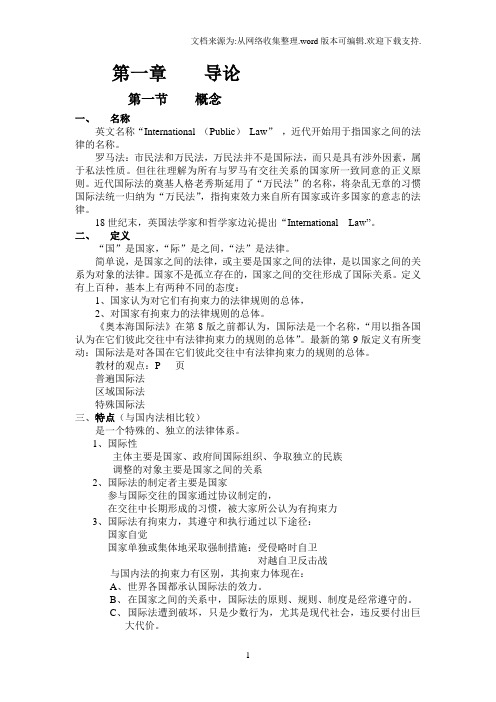
第一章导论第一节概念一、名称英文名称“International (Public)Law”,近代开始用于指国家之间的法律的名称。
罗马法:市民法和万民法,万民法并不是国际法,而只是具有涉外因素,属于私法性质。
但往往理解为所有与罗马有交往关系的国家所一致同意的正义原则。
近代国际法的奠基人格老秀斯延用了“万民法”的名称,将杂乱无章的习惯国际法统一归纳为“万民法”,指拘束效力来自所有国家或许多国家的意志的法律。
18世纪末,英国法学家和哲学家边沁提出“International Law”。
二、定义“国”是国家,“际”是之间,“法”是法律。
简单说,是国家之间的法律,或主要是国家之间的法律,是以国家之间的关系为对象的法律。
国家不是孤立存在的,国家之间的交往形成了国际关系。
定义有上百种,基本上有两种不同的态度:1、国家认为对它们有拘束力的法律规则的总体,2、对国家有拘束力的法律规则的总体。
《奥本海国际法》在第8版之前都认为,国际法是一个名称,“用以指各国认为在它们彼此交往中有法律拘束力的规则的总体”。
最新的第9版定义有所变动:国际法是对各国在它们彼此交往中有法律拘束力的规则的总体。
教材的观点:P 页普遍国际法区域国际法特殊国际法三、特点(与国内法相比较)是一个特殊的、独立的法律体系。
1、国际性主体主要是国家、政府间国际组织、争取独立的民族调整的对象主要是国家之间的关系2、国际法的制定者主要是国家参与国际交往的国家通过协议制定的,在交往中长期形成的习惯,被大家所公认为有拘束力3、国际法有拘束力,其遵守和执行通过以下途径:国家自觉国家单独或集体地采取强制措施:受侵略时自卫对越自卫反击战与国内法的拘束力有区别,其拘束力体现在:A、世界各国都承认国际法的效力。
B、在国家之间的关系中,国际法的原则、规则、制度是经常遵守的。
C、国际法遭到破坏,只是少数行为,尤其是现代社会,违反要付出巨大代价。
四、作用1、判断国际是非的标准,国际上的行为规则,2、确定国家具体的权利和义务关系的一种法律形式,3、国家在国际交往中自我约束的一种法律依据,4、国际裁判的法律依据。
国际法导论2
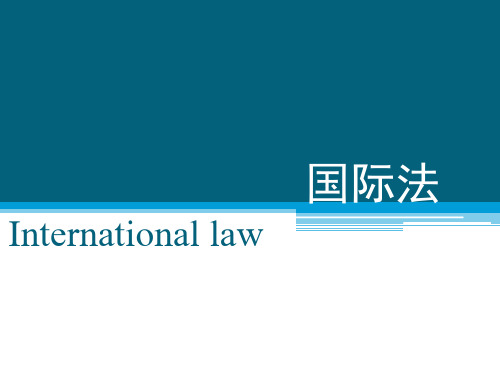
国际法
International law
第四节 国际法的主体
The subject of international law
• 你认为以下哪些是国际法的主体 • 梵蒂冈 巴勒斯坦民族解放组织 • 伊斯兰国
• 台湾 • 2005年9月14日,第六十届联合国总务委员会拒 绝将所谓“台湾在联合国的代表权”问题等提案 列入联大议程。这是自1993年以来总务委员会第 十三次拒绝类似提案。 • 绿色和平组织
第五节 国际法的基本原则
The Basic Principles of International Law
• 二、具体内容
2)理论 a.传统国家主权理论: 让.布丹 16世纪 《 论共和》----“主权是在一国 中进行指挥的绝对的和永久的权力。” 格老秀斯 ---“主权是国家最高统治权,不受其他 权力约束。” 卢梭----“主权是绝对不可转让,至高无上,不可 侵犯的。” Absolute 绝对主权论
国际法主要知识点整理

国际法第一章导论案例国际法的概念国际法的效力根据国际法的渊源国际法与国内法的关系国际法基本原则第一节国际法的概念一、国际法的名称(international law, law of nations, droit international )罗马法jus gentium万民法,格老秀斯(Hugo Grotius)叫万国法,边沁叫国际法。
国际法在19世纪中叶正式传入中国。
1864年丁韙良(William Martin)将惠顿Wheaton 《国际法原理》译成《万国公法》。
清末,“国际法”一词由日本传入中国。
一、国际法的名称(续):三类国际法规范1.普遍国际法(universal international law):适用于一切国家和其他国际法主体。
两个概念“对国际社会整体的义务”,对一切人的义务(erga omnes obligations)。
2.一般国际法(general international law):对绝大多数国家有拘束力的,除了一贯反对的国家。
3.区域国际法regional int. law 或特别国际法special int. law:世界上某个区域内的国家在相互交往中发展起来的,仅仅适用于这些国家之间关系的国际法规则,如所谓“美洲国际法”。
现行法lex lata和应有法lex ferenda。
二、国际法的定义影响国际法定义的因素:对国际法的主体、性质、范围以及效力根据等基本问题有不同见解。
国际(公)法public international law主要是调整国家之间关系的有法律拘束力的原则、规则和制度的总称。
国际法是在国家之间的相互交往中形成的,它是法律的一个特殊体系。
国际法的调整对象使它有别于国际私法private international law/law on conflict of laws和跨国法transnational law 。
国际私法主要是解决不同国家之间的民商事法律冲突问题,又称为“法律冲突法”或“法律的冲突”。
法律相关书籍
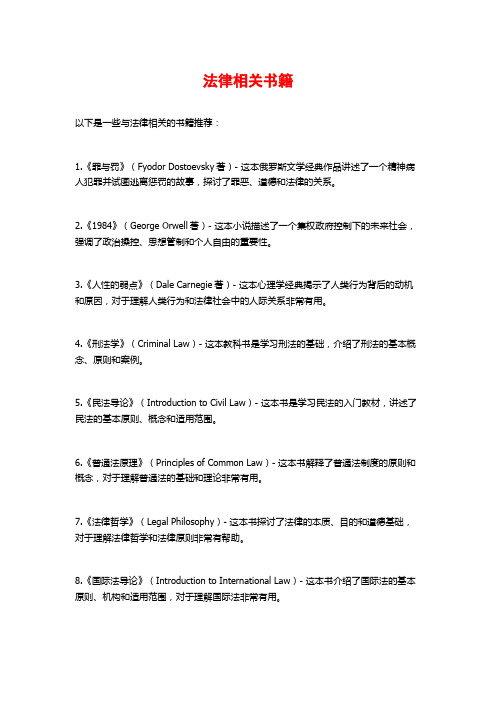
法律相关书籍
以下是一些与法律相关的书籍推荐:
1.《罪与罚》(Fyodor Dostoevsky著)- 这本俄罗斯文学经典作品讲述了一个精神病人犯罪并试图逃离惩罚的故事,探讨了罪恶、道德和法律的关系。
2.《1984》(George Orwell著)- 这本小说描述了一个集权政府控制下的未来社会,强调了政治操控、思想管制和个人自由的重要性。
3.《人性的弱点》(Dale Carnegie著)- 这本心理学经典揭示了人类行为背后的动机和原因,对于理解人类行为和法律社会中的人际关系非常有用。
4.《刑法学》(Criminal Law)- 这本教科书是学习刑法的基础,介绍了刑法的基本概念、原则和案例。
5.《民法导论》(Introduction to Civil Law)- 这本书是学习民法的入门教材,讲述了民法的基本原则、概念和适用范围。
6.《普通法原理》(Principles of Common Law)- 这本书解释了普通法制度的原则和概念,对于理解普通法的基础和理论非常有用。
7.《法律哲学》(Legal Philosophy)- 这本书探讨了法律的本质、目的和道德基础,对于理解法律哲学和法律原则非常有帮助。
8.《国际法导论》(Introduction to International Law)- 这本书介绍了国际法的基本原则、机构和适用范围,对于理解国际法非常有用。
这些书籍涵盖了不同领域和层次的法律相关内容,可以根据个人兴趣和学习需求选择阅读。
第一章:国际法导论

The Basis of International Law
第四节 国际法与国内法的关系
国际法与国内法的关系是国际法的一个基本 理论问题,也是一个实践问题,其根本的问 题在于国际法如何在国内实施。 国际法与国内法的关系涉及到两个问题,一 是国际法和国内法是属于同一个法律体系还 是属于两个不同的法律体系;二是如何使国 际法在国内产生法律效力。 对第一个问题的回答产生了一元论、二元论
第一节 国际法的概念 Concept of International Law
between nations\law among nations\ nations) ,即万国法 3、International law 1870年英国学者
边沁正式提出国际法 中国:1864年最初译为“万国公法” 中国:1864年最初译为“万国公法”,清 未后从日文译为“国际法” 未后从日文译为“国际法”
二、国际法的定义及其主要特征
1、定义:国际法是国家相互交往过程中形成的, 主要是调整国家间关系的具有法律拘束力的原则、 规则和制度的总称。 2、特征: (1)国际法的主体主要是国家; (2)国际法是通过国家间的协议制定的; (3)国际法的实施主要依靠国家单独或集体 的力量。
PROBLEMS OF DEFINITION
American Law Institute, Restatement
of the Foreign Relations Law of the United States (Third) §101(1987)
三、国际法与相邻法律部门的关系
国际法与国际私法
International Law and Private International Law
1、通过国内立法使条约在国内有法律效力, 如英国、比利时; 2、条约是国内法的一部分,在国内有效力, 不需要经过特别立法程序,如日本、法国 和德国; 3、 美国将条约分为“自动执行条约”和 美国将条约分为“自动执行条约” “非自动执行条约”,前者不需经过立法 非自动执行条约” 程序即可在国内法院得到适用,后者则需 经过立法程序转化为国内法后才可以被法 院适用。
国际法导论(General Introduction)

• 1.概念 • 1、周鲠生(1889-1971): • 国际法是在国际交往过程中形成出来的,各国承认的, 表现这些国家统治阶级的意志,在国际关系上对国家具有 法律拘束力的行为规范,包括原则、规则和制度的总体。 • 2、王铁崖(1913-2003): • 国际法主要是调整国家之间的关系的有法律约束力的原 则、规则和制度的总体。 • 3、梁西(1924-- ): • 国际法是在国际交往中形成的,用以调整国际关系(主 要是国家间关系)的,有法律约束力的各种原则、规则和 制度的 • 总称。
第七节 国际法与国内法的关系
• 二、国际法与国内法关系的实践
• (一)从国际法方面看 • (二)从国内法方面看
• 三、我国关于国际法与国内法关系的实践
• (一)条约(1)条约在国内的适用方式 • A.纳入(adoption),俄国; • B.转化(transformation):英国 • C.混合式 • 自动执行条约(self-executing treaty) • 非自动执行条约(non-self-executing):美国 • (二)国际习惯:国际习惯法规则只要不与现行国内法相冲突,则构成国
第四节 国际法的渊源
• 二、国际法的具体渊源
• • • • (一)条约 (二)国际习惯 (三)一般法律原则 (四)确定法律原则的补助资料:司法判例及权威公 法学家学说 • (五)公允及善良原则 • (六)国际组织、国际会议决议 • (七)准条约、软法
• 严格法律意义上的国际法渊源 • 1、国际条约(主要渊源) • a.造法性条约 • b.契约性条约 • 2、国际习惯(主要渊源) • a.国际习惯的形成条件 • · 物质因素:通例 • · 心理因素:被接受为法律 • b.国际习惯的形成 • c.国际习惯的查明 • e .国际习惯和国际条约之间的关系
国际法概论IntroductiontoInternational

2021/4/6
19
4.国际法的基本原则
❖原则五、善意履行国际义务原则
All Members, in order to ensure to all of them the rights and benefits resulting from membership, shall fulfill in good faith the obligations assumed by them in accordance with the present Charter
1993年5月安 理会通过的 《前南国际刑 事法院规约》 (第827号决议)
2021/4/6
14
3.国际法的渊源
❖司法裁决(International Judicial Decision) 与国际法
❖The decisions of court has no binding force except between the parties and in respect of that particular case.
international law public international law
国际法的概念:
国际法是指在国际交往中形成的,用以调整国际
关系(主要是国家间关系)的,有法律拘束力的
原则、规则和制度的总体。
The law dealing “with the conduct of states and of
❖原则三、和平解决国际争端原则
Principle of settling international disputes by peaceful means
2021/4/6
18
4.国际法的基本原则
❖原则四、不干涉内政原则
各大学专业及详细介绍书籍
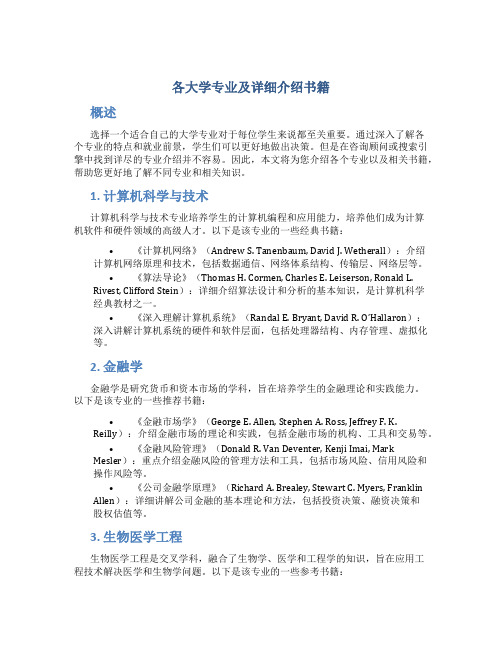
各大学专业及详细介绍书籍概述选择一个适合自己的大学专业对于每位学生来说都至关重要。
通过深入了解各个专业的特点和就业前景,学生们可以更好地做出决策。
但是在咨询顾问或搜索引擎中找到详尽的专业介绍并不容易。
因此,本文将为您介绍各个专业以及相关书籍,帮助您更好地了解不同专业和相关知识。
1. 计算机科学与技术计算机科学与技术专业培养学生的计算机编程和应用能力,培养他们成为计算机软件和硬件领域的高级人才。
以下是该专业的一些经典书籍:•《计算机网络》(Andrew S. Tanenbaum, David J. Wetherall):介绍计算机网络原理和技术,包括数据通信、网络体系结构、传输层、网络层等。
•《算法导论》(Thomas H. Cormen, Charles E. Leiserson, Ronald L.Rivest, Clifford Stein):详细介绍算法设计和分析的基本知识,是计算机科学经典教材之一。
•《深入理解计算机系统》(Randal E. Bryant, David R. O’Hallaron):深入讲解计算机系统的硬件和软件层面,包括处理器结构、内存管理、虚拟化等。
2. 金融学金融学是研究货币和资本市场的学科,旨在培养学生的金融理论和实践能力。
以下是该专业的一些推荐书籍:•《金融市场学》(George E. Allen, Stephen A. Ross, Jeffrey F. K.Reilly):介绍金融市场的理论和实践,包括金融市场的机构、工具和交易等。
•《金融风险管理》(Donald R. Van Deventer, Kenji Imai, Mark Mesler):重点介绍金融风险的管理方法和工具,包括市场风险、信用风险和操作风险等。
•《公司金融学原理》(Richard A. Brealey, Stewart C. Myers, Franklin Allen):详细讲解公司金融的基本理论和方法,包括投资决策、融资决策和股权估值等。
国际法重要知识点整理版
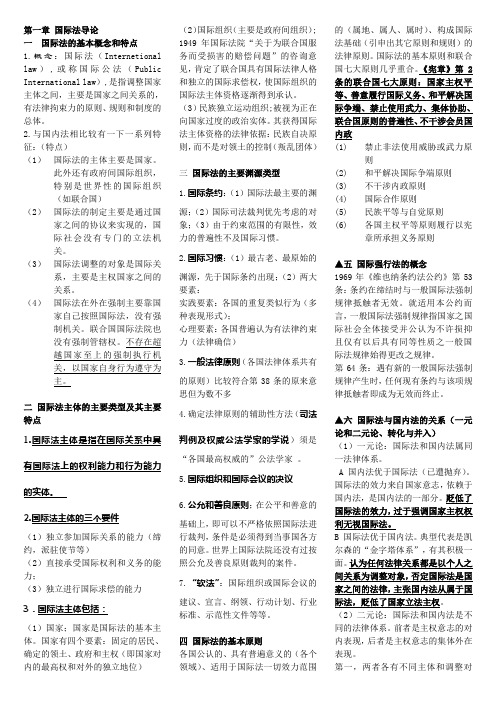
第一章国际法导论一国际法的基本概念和特点1.概念:国际法(Internetional law),或称国际公法(Public International law),是指调整国家主体之间,主要是国家之间关系的,有法律拘束力的原则、规则和制度的总体。
2.与国内法相比较有一下一系列特征:(特点)(1)国际法的主体主要是国家。
此外还有政府间国际组织,特别是世界性的国际组织(如联合国)(2)国际法的制定主要是通过国家之间的协议来实现的,国际社会没有专门的立法机关。
(3)国际法调整的对象是国际关系,主要是主权国家之间的关系。
(4)国际法在外在强制主要靠国家自己按照国际法,没有强制机关。
联合国国际法院也没有强制管辖权。
不存在超越国家至上的强制执行机关,以国家自身行为遵守为主。
二国际法主体的主要类型及其主要特点1.国际法主体是指在国际关系中具有国际法上的权利能力和行为能力的实体。
2.国际法主体的三个要件(1)独立参加国际关系的能力(缔约,派驻使节等)(2)直接承受国际权利和义务的能力;(3)独立进行国际求偿的能力3.国际法主体包括:(1)国家;国家是国际法的基本主体。
国家有四个要素:固定的居民、确定的领土、政府和主权(即国家对内的最高权和对外的独立地位)(2)国际组织(主要是政府间组织); 1949年国际法院“关于为联合国服国际法主体资格逐渐得到承认。
(3)民族独立运动组织;被视为正在向国家过度的政治实体。
其获得国际法主体资格的法律依据:民族自决原则,而不是对领土的控制(叛乱团体)三国际法的主要渊源类型1.国际条约:(1)国际法最主要的渊源;(2)国际司法裁判优先考虑的对象;(3)由于约束范围的有限性,效力的普遍性不及国际习惯。
2.国际习惯:(1)最古老、最原始的渊源,先于国际条约出现;(2)两大要素:实践要素:各国的重复类似行为(多种表现形式);心理要素:各国普遍认为有法律约束力(法律确信)3.一般法律原则(各国法律体系共有的原则)比较符合第38条的原来意思但为数不多4.确定法律原则的辅助性方法(司法判例及权威公法学家的学说)须是“各国最高权威的”公法学家。
国际法英文单词

绪论INTRODUCTION:NATURES OF INTERNATIONAL LAW Public International law国际公法
Universal国家不分大小,应该一律平等
to establish normal state relations 建立正常的国家关系
to seek a fair and reasonable solution 求得公平合理的解决
to make up for each other's deficiencies 取长补短
to negotiate through diplomatic channels 通过外交途径进行谈判
to safeguard national independence and the integrity of sovereignty
维护国家独立和主权完整
to safeguard world peace 维护世界和平
to solve disputes by peaceful means 用和平手段解决争端
in consideration of the actual conditions 照顾现实情况
the Five Principles of Peaceful Coexistence 和平共处五项原则
mutual respect for sovereignty and territorial integrity
互相尊重主权和领土完整
mutual non-aggression 互不侵犯
non-interference in each other's internal affairs 互不干涉内政
equality and mutual benefit 平等互利。
国际公法_英文名解汇总_纲目版
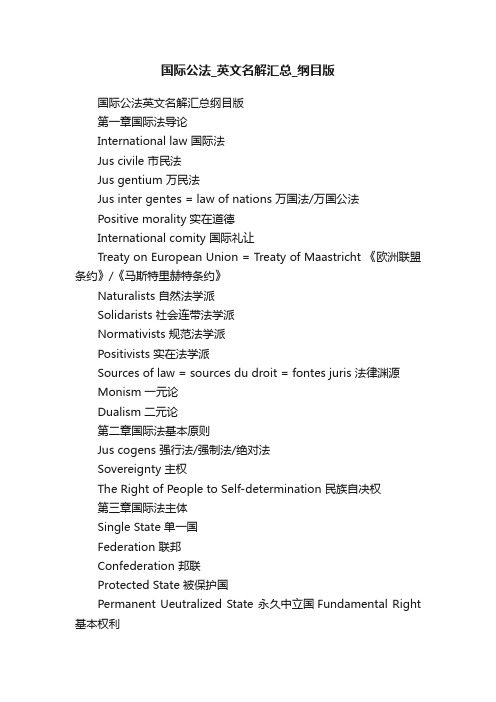
国际公法_英文名解汇总_纲目版国际公法英文名解汇总纲目版第一章国际法导论International law 国际法Jus civile 市民法Jus gentium 万民法Jus inter gentes = law of nations 万国法/万国公法Positive morality 实在道德International comity 国际礼让Treaty on European Union = Treaty of Maastricht 《欧洲联盟条约》/《马斯特里赫特条约》Naturalists 自然法学派Solidarists 社会连带法学派Normativists 规范法学派Positivists 实在法学派Sources of law = sources du droit = fontes juris 法律渊源Monism 一元论Dualism 二元论第二章国际法基本原则Jus cogens 强行法/强制法/绝对法Sovereignty 主权The Right of People to Self-determination 民族自决权第三章国际法主体Single State 单一国Federation 联邦Confederation 邦联Protected State 被保护国Permanent Ueutralized State 永久中立国Fundamental Right 基本权利Secondary Rights 派生权利Right of Independence 独立权Right of Equality 平等权Right of Self-preservation 自保权Right of Jurisdiction 国家管辖权Territorial Jurisdiction 属地管辖权/属地优越权Personal Jurisdiction = nationality jurisdiction = active personality principle 属人管辖权/国籍管辖/积极国籍管辖Protective Jurisdiction = passive personality principle 保护性管辖权/消极国籍管辖Universal Jurisdiction 普遍性管辖权Judicial immunities 外国国家的司法豁免权Recognition 国际法上的承认Effective control 有效统治Succession 国际法上的继承第四章国际法上的居民Nationality 国籍Inhabitant 居民Original nationality 原始国籍/出生国籍Jus sanguinis 血统主义Jus soli 出生地主义Acquired nationality 因加入而取得国籍Naturalization 入籍/归化Release 放弃(国籍)Deprive 剥夺(国籍)Dual nationality 双重国籍Active conflicts 国籍的积极抵触Stateless person 无国籍人Passive conflicts 国籍的消极抵触Alien 外国人Deportation 驱逐出境National treatment = doctrine of equality of treatment = NT 国民待遇/平等待遇原则International standard of treatment “文明世界”的“国际标准”/“最低标准”Most favorable national treatment = MFNT 最惠国待遇Differential treatment 差别待遇Extradition 引渡Principle of Non-extradition of Political Offenders 政治犯不引渡原则Attentat clause = Assassination Clause 行刺条款/比利时行刺条款/暗杀条款Principle of identity 相同原则/罪名同一原则/双重犯罪原则Principle of speciality 罪行特定原则Asylum 庇护Territorial asylum 领域庇护/域内庇护Extra-territorial asylum 域外庇护Refugee 难民Nansen passport 南森护照Convention refugees 公约难民Mandate refugees 章程难民Principle of non-refoulement 不推回原则/禁止驱逐、送还原则Diplomatic protection 外交保护Doctrine of continuous nationality 国籍连续原则Exhaustion of local remedies 用尽国内救济原则Calvo clause 卡尔沃条款Calvo doctrine 卡尔沃主义第五章国家法律责任International responsibility 国际法律责任/国际责任Primary rules 确定合法、非法的行为规则/是非规则/首要规则Secondary rules 国际法律责任规则/一般法律责任规则/责任规则/次级规则Distress 危难Necessity 危急情况Restitution 恢复原状Reparation 广义赔偿Compensation 狭义赔偿/经济赔偿Satisfaction 抵偿第六章领土法Land territory 领陆Territory Waters 领水Air space 领空Subsoil beneath state territory 底土Enclave 飞地Ownership 所有权Domination 统治权Condominium 共管Leased territory 租借International servitude 国际地役Internal waters 内水Internal rivers 内河Boundary rivers 界河Non-national rivers 多国河流International rivers 国际河流Inter-oceanic canals 通洋运河Occupation 先占/占领Vacant land 无主地Effective occupation 有效占领Prescription 时效Accretion 添附Cession 割让Conquest 征服Plebiscite 全民投票/全民公决Self-determination of peoples 民族自决The exchange of territory 交换领土Reversionary rights 收复失地Boundaries of state territory 国家边界第七章国际海洋法The common heritage of mankind 人类共同继承财产The United Nations Convention on the Law of the Sea 《联合国海洋法公约》Base line 基线Normal baseline 正常基线Straight baseline 直线基线Archipelagic baseline 群岛基线Innocent passage 无害通过Contiguous zone 毗连区/邻接区/海上特别区Exclusive economic zone 专属经济区Continental shelf 大陆架High seas 公海Flag of convenience 方便旗Right of visit 登临权/临检权Right of hot pursuit 紧追权Straits used for international navigation 用于国际航行的海峡Transit passage 过境通行Archipelagic waters 群岛水域Right of archipelagic sea lanes passage 群岛海道通过权International sea-bed area 国际海底区域Single exploitation system 单一开发制Parallel exploitation system 平行开发制第八章国际航空法Air defence identification zone = ADIZ 防空识别区/空中识别区Cabotage 国内载运权The International Civil Aviation Organization = ICAO 国际民用航空组织Dol = wilful misconduct (承运人的)加害行为/故意造成损害的不法行为/故意的行为/不在乎地不顾后果的行为Two tier liability “双梯度”责任制度/两级责任制Aut dedere aut judicare 或引渡或起诉原则Aut dedere aut punier 或引渡或处罚第九章外层空间法Outer space 外层空间第十章国际环境法Sustainable development 可持续发展Pollution from vessels 船舶污染Pollution by dumping 控制海洋倾倒Pollution from land-based sources 陆源污染第十一章外交关系法Consular provision 委任文凭Consular exequatur 领事证书Diplomatic relations 外交关系Consular relations 领事关系Diplomatic Privileges andImmunities外交特权与豁免第十三章国际条约法The Vienna Convention on the Law of Treaties 《维也纳条约法公约》Treaty 条约Convention 公约Convention 专约Agreement 协定Protocol 议定书Final act 最后议定书/蒇事议定书Covenant 盟约Charter 宪章Statute 规约Exchange of Notes 换文Declaration 宣言Joint statement 联合声明Bilateral treaty 双边条约Multilateral treaty 多边条约Negotiation (条约)谈判Full power 全权证书Adoption 议定Authentication 认证Signature 签署Ratification 批准Accession 加入Reservation 保留Registration 登记Publication 公布Pacta sunt servanda 条约必须遵守原则Pacta tertiis nec nocent nec prosunt 约定对第三者既无损,也无益Termination 条约的终止Invalidation 条约的失效Suspension 条约的暂停施行/条约的中止/条约的停止施行Interpretation 条约的解释Revision 条约的修订Amendment 条约的修正Modification 条约的修改第十四章国际组织法International organization 国际组织Inter-governmental organization 政府间组织International institutional law 国际组织法Concert of Europe 欧洲协商Non-governmental organization 非政府间国际组织Organization of petroleum exporting countries = OPEC 石油输出机构/石油输出国组织Organization for economic cooperation and development = OECD 经济协力开发机构/经济合作与发展组织/经合组织General Assembly 联合国大会Security Council 安全理事会/安理会Economic and Social Council 经济与社会理事会/经社理事会Trusteeship Council 托管理事会International Court of Justice 国际法院Secretariat 秘书处Specialized International Organization 专门性国际组织Specialized Agencies 联合国专门机构International telecommunication union = ITU 国际电信联盟Universal postal union = UPU 万国邮政联盟World meteorological organization = WMO 世界气象组织World health organization = WHO 世界卫生组织International labour organization = ILO 国际劳工组织Food and Agriculture Organization of the United Nations = FAO 联合国粮食及农业组织/联合国粮农组织United Nations Educational,Scientific,and Cultural Organization = UNESCO 联合国教科文组织International monetary fund = IMF 国际货币基金组织International bank for reconstruction and development = IBRD 国际复兴开发银行/世界银行International civil aviation organization = ICAO 国际民用航空组织International finance corporation = IFC 国际金融公司International maritime organization = IMO 国际海事组织International development association = IDA 国际开发协会World intellectual property organization = WIPO 世界知识产权组织International fund of agricultural development = IFAD 国际农业发展基金(组织)United Nations Industrial Development Organization = UNIDO 联合国工业发展组织World trade organization = WTO 世界贸易组织International atomic energy agency = IAEA 国际原子能机构Collective security 集体安全保障Peace-keeping operations = PKO 联合国维持和平行动Regional organization 区域性国际组织Organization of American States = OAS美洲国家组织Arab League = League of Arab States = AL = LAS 阿拉伯国家联盟/阿拉伯联盟/阿盟African union = AU 非洲联盟/非盟Organization of African Unity = OAU 非洲统一组织/非统组织Association of Southeast Asian Nations = ASEAN 东南亚国家联盟/东盟European community = EC 欧洲共同体ECSC 欧洲煤钢共同体EUBATOM 欧洲原子能共同体EEC 欧洲经济共同体European union = EU 欧洲联盟Shanghai Cooperation Organization =SCO 上海合作组织/上合组织Asian-Pacific Economic Cooperation organization = APEC 亚太经合组织第十五章国际人权法Human Rights 人权The responsibility to protect 保护的责任The Universal Declaration of Human Rights 《世界人权宣言》The International Covenant on Civil and Political Rights 《公民权利和政治权利国际公约》The International Covenant onEconomic,Social and Cultural Rights 《经济、社会和文化权利国际公约》第十六章国际刑法International criminal law 国际刑法International crimes 国际犯罪The direct enforcement model 直接执行模式The indirect enforcement model 间接执行模式International penal judicial assistance 国际刑事司法协助Extradition 引渡Principle of non-extradition of political offenders 政治犯不引渡原则Assassination Clause = Attentat clause 行刺条款/暗杀条款/比利时行刺条款Transfer jurisdiction of criminal procedure 刑事诉讼移管/刑事诉讼移转管辖Recognition and enforcement of foreign penal judgements 外国刑事判决的承认和执行International criminal jurisdiction 国际刑事管辖第十七章国际争端法International disputes 国际争端Legal disputes = justiciable disputes 法律性质的争端/可裁判的争端Political disputes = Non-justiciable disputes 政治性质的争端/不可裁判的争端Compulsive means 强制方法Negotiation 谈判Consultation 协商Good office 斡旋Mediation 调停International inquiry 国际调查/调查Conciliation 和解/调解Bryan peace treaties 《布赖恩和平条约》/冷却条约International arbitration 国际仲裁/国际公断Jay treaty 杰伊条约Permanent court of arbitration 常设仲裁法院Judicial settlement 司法解决The permanent court of international justice 常设国际法院International court of justice 国际法院Contentious jurisdiction 诉讼管辖权Optional compulsory jurisdiction 任意强制管辖Connally reservation 康纳利保留条款Advisory jurisdiction 咨询管辖权Regional agency = Regional arrangement 区域机关/区域办法第十八章战争法Law of war 战争法Law of armed conflict 武装冲突法Animo belligerendi 交战意向Jus ad bellum 诉诸战争权Suspension of arms 停战Surrender 投降International humanitarian law 国际人道法Crimes against humanity 违反人道罪War time neutrality 战时中立War neutrality law 战时中立法Permanent neutralized state 永久中立国/中立化国家War crimes 战争犯罪。
国际法专业中英文

国际法专业:民法专题研究Studies on Civil Law国际公法International Law国际私法International Private Law国际经济法导论Introduction to International Economic Law国际贸易法专题研究Studies on Internation trade law国际金融法专题研究Studies on International Financial Law国际投资法专题研究Studies on International Investment Law国际商事仲裁专题Research on International Commercial arbitration 海商法专题研究Studies on Maritime Law商法学专题研究Studies on Business Law涉外经济法专题Research on Foreign Economic Law欧盟法专题Research on EU LawWTO法专题Research on WTO Law法律英语Legal writing & Legal research民商法专业:民法总论Civil Law in General商法专题研究Studies on Business Law知识产权法专题研究Studies on Intellectual Property Law债法研究Research on Obligation Law物权法研究Research on Real Right Law国际商法研究Research on International Commercial Law诉讼法专题Research on Procedure Law海商法专题研究Studies on Maritime Law票据法专题研究Studies on Law of Negotiable Instruments信托法专题研究Studies on trust law金融法专题研究Studies on financial law比较民法研究Comparative research on Civil Law法律英语Legal writing & Legal research。
国际法——精选推荐

国际法国际法总论第⼀章导论第⼀节国际法的名称⼀、近代观点1、“国际法之⽗”,荷兰法学家格⽼修斯,在1625年《战争与和平法》中,万国法。
2、英国法学家边沁,18世纪末,国际法,《道德及⽴法原理⼊门》。
3、public——国际公法。
privite——国际私法⼆、现代观点国际法的概念:在国际交往中形成的,主要调整国家间关系的,有法律拘束⼒的原则、规则和制度的总体。
国际法的特点:1、国际法的主体主要是国家,调整的关系主要是国家之间的关系。
传统观点:国家是国际法的唯⼀主体。
现代观点:国家是国际法的基本主体。
2、国际法主要是国家之间以协议的⽅式指制定的。
3、国际法的效⼒及于整个国际社会。
4、国际法采取不同于国内法的特殊的强制实施⽅式。
第⼆节国际法的效⼒根据(⼀)国际法的效⼒根据——国家间的协议1、国家间的协议反映了各国协调意志。
2、各国达成的协议是各国作为国际法制定者通过⼀定的⽴法程序共同制定的法律⽂件。
3、各国之间的协议是各国强制执⾏国际法的根据。
(⼆)国际法的实在根据1、各国的宪法(1)规定国际法在国内适⽤。
1987年韩国宪法第6条第⼀项:依据宪法缔结和颁布的条约和普遍承认的国际法规与国内法具有同等效⼒。
(2)承认国际法的优越性。
1959年荷兰宪法第63条:如为国际法律秩序发展的必要,条约可与宪法相抵触。
2、各国的实践。
1983年9⽉1⽇韩国民航机007号被前苏联击落。
3、国际条约的规定及国际组织的实践(1)《联合国宪章》第四条规定加⼊联合国的国家要承认宪章中的义务。
(2)各种国际法院是为直接适⽤国际法⽽设置的。
第三节国际法学说⼀、传统学说(⼀)格⽼修斯学派代表⼈物:德国的沃尔夫;瑞⼠的⽡尔特。
1、国际法效⼒的根据是依据⾃然法,是理性。
2、协定是国家的共同同意。
(⼆)⾃然法学派代表⼈物:普芬道夫提出所谓⼈类良知、⼈类理性、⼈类法律意识等⼀些抽象的⾃然法概念,作为国际法效⼒的根据。
(三)实在法学派代表⼈物:荷兰的宾客舒克国际法的效⼒依据,不是如⾃然法学派所说的“理性之所命”,⽽是由于国家的承认;国际法的规则不是依推理的程序来发现,⽽是⽤归纳的⽅法从国际交往中去推求;“公认”是国际法的唯⼀基础。
International Law国际法课件英文版

Payment Mechanisms
Letter of Credit Correspondent Banking
Foreign Corrupt Practices Act
/watch?v=08zZKp4EGeQ&feat ure=related Forbids Bribery "Grease" Payments Accounting
Grade no lower than A-minus Breach requirements = Grade no higher than C
/watch?v=9M5wWSA5vQQ /watch?v=Aazov-F30Hw
Last Name, (Mr., Mrs., Miss, Ms.)
If you prefer not lead prayer
X
Set Forth In Student Honor Contract
Teach a 50 Lesson on one chapter from assigned reading Case Study Geography Test = 90%
FAS (free alongside ship) at a named port of export where the seller quotes a price for the goods that includes the charge for delivery of the goods alongside a vessel at the port. The seller handles the cost of wharfage, while the buyer is accountable for the costs of loading, ocean transportation, and insurance. FCA (free carrier) at a named place. This term replaces the former "FOB named inland port" to designate the seller's responsibility for handing over the goods to a named carrier at the named shipping point. It may also be used for multimodal transport, container stations, or any mode of transport, including air. FOB (free on board) at a named port of export where the seller quotes the buyer a price that covers all costs up to and including the loading of goods aboard a vessel.
国际法课件_国际法导论

国际法专指的是国际公法,而国际私法 主要调整的是具有涉外关系的民事法 律关系发生法律抵触时的法律适用问 题。 国际法与部门法 普遍国际法与特殊国际法/区域国际法
• 二、国际法的作用
国际法功能体现在社会作用和规范作用: 1、社会作用在于通过体现各国的协调意 志来为各国在国际关系交往中的需要服 务。 2、规范作用表现在指引、评价、教育、 预测和强制伍方面。
违反国际法行为的救济措施: 对于那些违反国际法行为的国家,可以 通过受害国单独地或与其它国家集体采 取相应的强制措施,以保护受害国的权 利,并保证国际法能够得到较有效的实 施。如:警告,要求终止不法行为、保 证不再重犯、恢复原状、赔偿,采取报 复措施,实行经济制裁等。
(二)、国际法的概念 教材上的定义:是国家之间在交往过程中形成 并经各国协议确认的,主要用以调整国家之 间关系的具有法律拘束力的原则、规则、规 章和制度的总称。 赵建文先生的定义:“国际法是对国际社会成 员具有法律拘束力的行为规范.” 端木正先生的定义:“国际法主要是国家在其 相互交往中形成的,主要调整国家间关系的 有拘束力的原则、规则和规章制度的总和。
国家的行为在传统国际法上几乎未受到 什么约束。 (1) 、在传统国际法中国家能在最大程度 地自由决定自己的体制,政治体制、经 济制度法律体系等。 (2) 、国家完全自主决定对外政策。在传 统国际法上,国家有权参加任何条约:
但是在一战后,特别是在二战之后,国 际法在国家行为的自由上增加了一些限 制,主要表现在三方面: (1) 、大量国际条约的建立了范围广泛的 网络,绝大多数的国家都是国际条约的 签约国,大量的条约也因此影响着各个 签约国的国内法律体系。 (2)、禁止使用武力的各种法律约束 (3) 、强行法 (jus cogens) 限制了各国的 行为。
国际法(双语)1__Introduction-2011-1
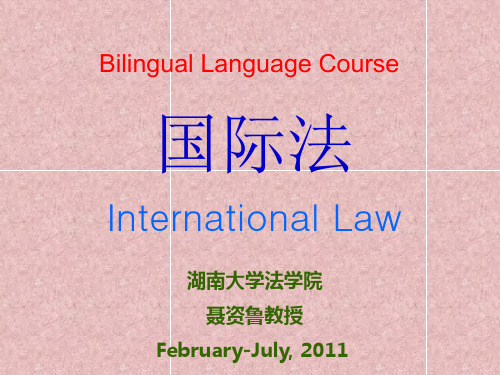
一、国际法的特征 1.1 characters of international law
Special Warning: 特别提示
However, from the practical point of view; it is
well to remember that international law is primarily a system regulating the rights and duties of states on the international platform. And States still are the basic or primary subjects of international law.----Why?
law transnational law; law of humanity International law (Bentham)英国著名哲学
家和法学家边沁
conflict of laws (国际私法,冲突法) International Law public international law(国际公法)
The subjects of international law may have the following
three features: (1) the independent capacity to take part in the international relation independently.
一、国际法的特征 1.1 characters of international law
(二)国际法的特征characters of International
国际公法学(第一章)

(三)中国“国际法”名称
历史上第一位被介绍到中国的西方法学家是瑞士的著名国
际法学家瓦泰尔(Emerich de Vattel),1839年林则徐主持 翻译了《国际法:适用于各国和各主权者的行为和事务的自然
法原则》中的几段,内容涉及战争、敌对措施,如封锁、禁运
等。 1864年(同治三年),美国传教士丁韪良认为瓦特尔一书
(二)国际法的规范体系
从国际法的适用范围来划分,国际法是由普遍国际法(或一
般国际法)、区域国际法和特殊国际法构成的规范体系。 1.普遍国际法和一般国际法 所谓普遍国际法就是各国公认的国际法,指国际习惯和国际 条约中对所有国家都有法律拘束力的国际法。1970年《国际法原
则宣言》指出,每一国家均有责任诚意履行其依公认的国际法原
论》中最早提出“国际法”这一名称。由于这个名称中包含 “inter”(之间)的意思,恰切地体现了国际法的特征,因此
,“international law”作为国际法的名称被国际社会广泛地
采用。
【习题】国际关系史上第一个正式使用国际法名称的学者是 ( B )。 A.沃尔夫 B.边沁 C.奥本海 D.宾刻舒克
案例:国际法有用吗?
1864年,普鲁士政府派遣李斯福为驻华公使,4月间,李斯 福乘坐兵舰“羚羊号”抵达中国天津大沽口海域,遭遇三艘丹 麦商船。当时普丹正在欧洲因领土问题交战,于是,普鲁士兵 舰将三艘丹麦商船拿捕。清政府根据惠顿《万国公法》第2卷第 4章第6节:“中国所管海面,及澳港长矶所抱之海,此外更有 沿海各处,离岸十里之遥,依常例归其辖也。盖炮弹所及之处 ,国权亦及焉,凡此全属其管辖,他国不与也”,认为普舰在 中国洋面拿捕丹麦商船,“显系夺中国之权”。并与普鲁士公 使进行了严正交涉,最终迫使普舰释放二艘丹麦商船,并对第 三艘予以折款抵偿。
- 1、下载文档前请自行甄别文档内容的完整性,平台不提供额外的编辑、内容补充、找答案等附加服务。
- 2、"仅部分预览"的文档,不可在线预览部分如存在完整性等问题,可反馈申请退款(可完整预览的文档不适用该条件!)。
- 3、如文档侵犯您的权益,请联系客服反馈,我们会尽快为您处理(人工客服工作时间:9:00-18:30)。
International Law versus Political Science
► Since
there is no enforcement in international law, all the actions are determined by conflicts, struggles, possible consensus, conspiracies, or sophisticated calculations. ► So, isn’t it the, simply put, POLITICS?
► But
international law only refers to the first proposition
Example of International Law
► Winners
wrote the history. ► Only the defeated will be labeled as “war criminal.”
International Politics
► Politics
among states, level of analysis ► Differences between International Politics and Taiwan Politics ► Theoretical boundary between International Relations and Domestic Politics: Anarchy vs. Hierarchy
Introduction to International Law
Intro
► International
Law versus Law ► International Law versus Political Science ► Basic Concepts ► Learning International Ls Law
► “Law”
is a system of social rules usually enforced through a set of structured institutions.
International Law versus Law
Example of Law
► First
Proposition: 10 Commandments by Moses: #6, Thou Shall Not Kill ► Second Proposition: If you kill, you will be punished by…
International Law versus Law
Anarchy
► Example:
If you got a parking ticket just because of a broken meter, what would you do? ► Example: If Cuba invaded Miami, what would the US do? ► Example: If you had to go to a bad neighborhood with weak police enforcement, what would you prepare for this trip? ► Definition: “No supreme power to govern,” “no overarching power,” “Self help system” ► Anarchy vs. Chaos, Anarchic world still has order. ► Value, legal and study system in an anarchic world
► “Public
law" subjects, which relate closely to the state (including constitutional, administrative and criminal law) ► “Private law" subjects (including contract, tort, property)
Example of International Private Law
► It
is relatively easier for two locals to file divorce. If one of the couple were a foreigner, then the foreign law should be considered by local court. ► However, it does not mean that foreign country has any say in the legal consideration. It is a private and foreign individual versus the state legal system. ► And the true international law is one legal system versus another, or others.
Realism vs. Liberalism
Subjects Human Nature Nature of IR Most Important Actor Goal of Foreign Policy Favorable Form of Government Trade Best Way to Achieve Peace Power Cooperation Morality and Value Realism Bad and Selfish Anarchy State Security/More Power Regime type does not matter Relative Gain Balance of Power Hard Power If worthy, cheaper than confrontation Not as important as power Liberals Malleable, can be educated and improved Anarchy State/International Organization Security/Domestic Well-being Democracy Absolute Gain Kantian Triangle Soft Power Desirable but with cautious negotiation Not as important as power and cooperation
International Law versus Law
► The
key word is still “enforcement.” ► Although domestic enforcement did not get all the bad guys, (most of time, the function of domestic law is a lot worse than international law) at least bad guys would not claim themselves as just, like most of bad states in the history and now.
State
►A
corporate body exercising or claiming to exercise, sovereign political power over a particular geographic area. Sovereign power implies a monopoly on the legitimate use of violence and must be recognized by other sovereign states.
Basic Concepts
► Politics ► International ► Anarchy
Politics
► State
► Realism
vs. Liberalism ► International Organization and Institution ► International Law
International Law versus Law
► International
law (public), which involves for instance the United Nations, maritime law, international criminal law and the Geneva conventions. ► International law (private) or conflict of laws, which addresses the question of which legal jurisdiction cases may be heard in.
Example
► The
Rape of Nanking ► United States in Iraq
The Rape of Nanking
United States in Iraq
Intro
► International
Law versus Law ► International Law versus Political Science ► Basic Concepts
Subtle Difference
► By
definition, International private law is still the “law,” since the domestic courts could generate the ruling toward the legal case and enforce it.
